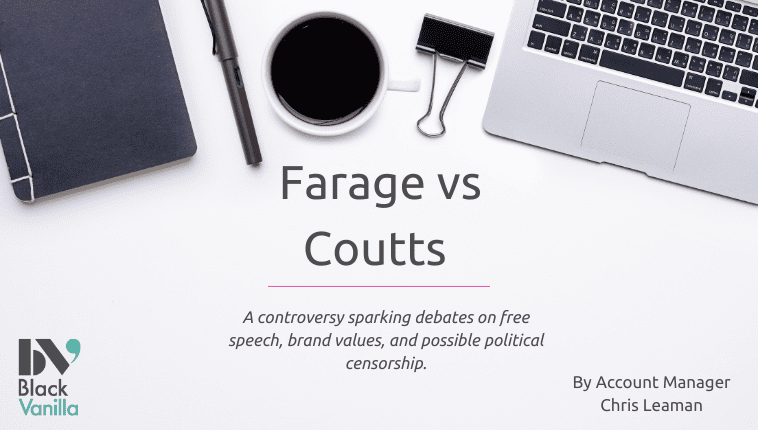
Coutts reputation blunder
Farage vs Coutts. A move against free speech or a global brand standing by its values?
Coutts’s closing of Nigel Farage’s bank accounts has been so hotly reported with daily updates and expert amplification from Mr Farage himself, it feels like a five-day test cricket match. However, the premium bank has failed to hit a six with their communication on the situation.
It’s safe to say, and to continue the cricket analogy, Coutts were in for a challenge from the first ball. Farage has made his point well heard, and Coutts’s relative radio-silence has left a cloud of doubt and plenty of room for speculation over the full story. As we say in PR, Farage ‘has owned the narrative.’
Nevertheless, the emerging story led me to consider whether their response might be viewed by the public as a brand sticking by its values or an act of hypocritical political censorship.
The bank had remained quiet, leaving plenty of airtime for Farage, until an apology from the Chief Executive of the Coutts parent bank, NatWest Group, was received by the former Brexit party leader – several weeks after the high-end bank was publicly named.
This debate has once again fuelled the conversation on ‘cancel culture’ and could lead to more supporters of far-winged arguments to emerge, or the polar opposite, more people hiding their opinions for risk of equally being shunned.
None of us know the reasons for closing his accounts, but it’s not unheard of for banks to review clients. Many financial institutions hold financial eligibility criteria, commercial viability, reputational considerations and much more.
However, I would always recommend a greater emphasis needs to be placed on clear communication, however, that has to be balanced with client confidentiality and the legal implications.
Whilst their hands might be tied, Coutts’s silent approach left room for misconceptions to brew. As soon as news broke, the bank could have got on the front foot, explaining their right to close accounts (non-specific), along with a swift internal investigation, signally that the bank is taking action. That might have led them to making an apology sooner, saving them the embarrassment of prolonged media coverage.
I have no doubt this won’t be the last story of this kind. Brands will continue to travel a delicate road – serving customers impartially, regardless of personal views, and standing with their values.
Ultimately, the closure of Nigel Farage’s bank accounts by Coutts has sparked a complex debate, touching on issues of free speech, brand values, and possible political censorship. It remains challenging to ascertain the full truth of the matter.
It has since come to light that NatWest boss, Dame Alison Rose has resigned, admitting she made a mistake talking about Farage’s relationship with the bank, just hours after the bank published a public message of support. The timing of the two actions makes the organisation seem even less in control, and ultimately, Dame Rose has paid for the mistake with her job.
Brands, however, can learn valuable lessons from this public battle – prioritising clear communication and transparency in their decisions.
Of course, brands should follow their vision and values, to do otherwise will risk being called out for hypocrisy. Yet navigating a path through polarised opinions and increasing stakeholder activism is becoming harder and harder, particularly for high-profile brands.
What do you think about the story? Is it a strong public showcase of values or censorship because of an individual’s views? Get in touch with Chris at chris@black-vanilla.gg